June 9, 2016 •
New York Senator Seeks Transparency in LLC Contributions
Sen. Patrick Gallivan has introduced a bill to increase transparency when corporations contribute through limited liability companies (LLCs). Under the current law, corporations may contribute $5,000 per year to a candidate, while LLCs may give up to $60,800. As a […]
 Sen. Patrick Gallivan has introduced a bill to increase transparency when corporations contribute through limited liability companies (LLCs).
Sen. Patrick Gallivan has introduced a bill to increase transparency when corporations contribute through limited liability companies (LLCs).
Under the current law, corporations may contribute $5,000 per year to a candidate, while LLCs may give up to $60,800. As a result, many corporations set up LLCs in order to contribute in excess of contribution caps, and there is no limit on the number of LLCs a corporation may create.
Senate Bill 8035 would require corporations creating LLCs to identify themselves. Unlike other proposed legislation focused on the “LLC loophole,” this bill would not lower the amount an LLC may contribute.
June 1, 2016 •
New Ethics Reform Plan Introduced in New York Legislature
Sen. Robert Ortt has introduced a new plan to fight corruption in the Legislature. His “Shake up the Status Quo” plan aims to fight corruption by combining elements from several recent bills into a single bill with three planks: pension […]
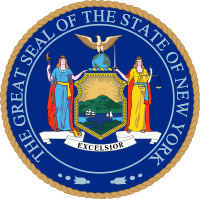 Sen. Robert Ortt has introduced a new plan to fight corruption in the Legislature.
Sen. Robert Ortt has introduced a new plan to fight corruption in the Legislature.
His “Shake up the Status Quo” plan aims to fight corruption by combining elements from several recent bills into a single bill with three planks: pension forfeiture for elected officials convicted of corruption charges; term limits; and additional ethics oversight.
Although Ortt is optimistic the bill can pass before the Legislature adjourns, only nine days are left in the legislative session.
May 27, 2016 •
Rochester Ethics Board Seeks Appointment Reforms
The City of Rochester Ethical Practices Board has formally requested the City Council and Mayor Ardell Brede review the process for appointing community members to advisory commissions and boards. The board requests review in the following five areas of the […]
 The City of Rochester Ethical Practices Board has formally requested the City Council and Mayor Ardell Brede review the process for appointing community members to advisory commissions and boards.
The City of Rochester Ethical Practices Board has formally requested the City Council and Mayor Ardell Brede review the process for appointing community members to advisory commissions and boards.
The board requests review in the following five areas of the current process: announcing new positions to the public; conducting interviews for open positions; establishing a reasonable time between the mayor selecting a candidate and City Council’s review; putting a concerted effort into gender and ethnic adversity on boards and commissions; and developing a consistent and transparent appointment process.
The request includes recommended changes and comes in response to concerns over appointing former lobbyists to boards directing public funds or steering policy.
May 25, 2016 •
New York Governor Seeks to Close Fundraising Loophole
Gov. Andrew Cuomo has proposed eight bills to the state Legislature to close a controversial loophole in campaign finance law permitting limited liability companies (LLCs) to make donations up to $60,800 per statewide candidate, with an aggregate limit of $150,000. […]
 Gov. Andrew Cuomo has proposed eight bills to the state Legislature to close a controversial loophole in campaign finance law permitting limited liability companies (LLCs) to make donations up to $60,800 per statewide candidate, with an aggregate limit of $150,000.
Gov. Andrew Cuomo has proposed eight bills to the state Legislature to close a controversial loophole in campaign finance law permitting limited liability companies (LLCs) to make donations up to $60,800 per statewide candidate, with an aggregate limit of $150,000.
Each bill offers different levels of control over LLC funding with one seeking to close the loophole for all candidates running for state office, another impacting only gubernatorial and state Legislature candidates, and four separate bills aiming to close the loophole for at least one state office.
All of the bills propose to bring the LLC contribution limit in line with state limits on corporate contributions to candidates and committees, which are currently set at $5,000 annually.
May 24, 2016 •
New York’s JCOPE Budgets to Defend Regulation
Earlier this year, the state Joint Commission on Public Ethics (JCOPE) made a regulatory change requiring public relations professionals to document outreach to editorial boards and report their activity to the state as lobbying. The regulation is now being contested […]
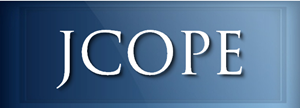 Earlier this year, the state Joint Commission on Public Ethics (JCOPE) made a regulatory change requiring public relations professionals to document outreach to editorial boards and report their activity to the state as lobbying.
Earlier this year, the state Joint Commission on Public Ethics (JCOPE) made a regulatory change requiring public relations professionals to document outreach to editorial boards and report their activity to the state as lobbying.
The regulation is now being contested by public relations firms who have joined in a federal suit challenging the reporting requirement under free speech provisions of the First Amendment. In response, the commission has budgeted $300,000 annually to a legal defense fund to support this measure.
The Assembly is negotiating language for a proposed state constitutional amendment to strip corrupt lawmakers of their pensions. If approved by voters, the amendment would enable judges to revoke lawmakers’ pensions when they are convicted of corruption charges. The measure […]
 The Assembly is negotiating language for a proposed state constitutional amendment to strip corrupt lawmakers of their pensions. If approved by voters, the amendment would enable judges to revoke lawmakers’ pensions when they are convicted of corruption charges. The measure would need to be approved again next year to appear on the ballot.
The Assembly is negotiating language for a proposed state constitutional amendment to strip corrupt lawmakers of their pensions. If approved by voters, the amendment would enable judges to revoke lawmakers’ pensions when they are convicted of corruption charges. The measure would need to be approved again next year to appear on the ballot.
Although numerous, broader bills seeking ethics and campaign finance reforms have been introduced this session, they are not expected to pass before the session ends in June.
May 10, 2016 •
New York Bill Aims to Curb Corporate Campaign Contributions
The Elections Committee approved a bill to reduce the corporate contribution limit from $5,000 to $1,000 per year and to close a loophole permitting political contributions from limited liability companies. Senate Bill 60, introduced by Sen. Daniel Squadron in 2015, […]
 The Elections Committee approved a bill to reduce the corporate contribution limit from $5,000 to $1,000 per year and to close a loophole permitting political contributions from limited liability companies. Senate Bill 60, introduced by Sen. Daniel Squadron in 2015, passed the committee this week, while a parallel bill was being passed in the Assembly.
The Elections Committee approved a bill to reduce the corporate contribution limit from $5,000 to $1,000 per year and to close a loophole permitting political contributions from limited liability companies. Senate Bill 60, introduced by Sen. Daniel Squadron in 2015, passed the committee this week, while a parallel bill was being passed in the Assembly.
In response to recent political scandals across the state, those supporting the bill are calling for an up-or-down Senate vote by the end of the legislative session.
May 5, 2016 •
New York Representative Seeks Ethics Reform
Rep. Steve McLaughlin is seeking bipartisan support for a package of ethics reform bills. The bills seek reform on multiple fronts by lowering the permissible amount individuals, unions, corporations, lobby groups, or businesses can donate to a PAC; increasing disclosure […]
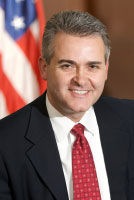 Rep. Steve McLaughlin is seeking bipartisan support for a package of ethics reform bills. The bills seek reform on multiple fronts by lowering the permissible amount individuals, unions, corporations, lobby groups, or businesses can donate to a PAC; increasing disclosure requirements for pay-to-play lobbying; placing eight-year term limits on legislative leaders; and stripping pensions from those convicted of public corruption offenses.
Rep. Steve McLaughlin is seeking bipartisan support for a package of ethics reform bills. The bills seek reform on multiple fronts by lowering the permissible amount individuals, unions, corporations, lobby groups, or businesses can donate to a PAC; increasing disclosure requirements for pay-to-play lobbying; placing eight-year term limits on legislative leaders; and stripping pensions from those convicted of public corruption offenses.
The proposed bills come in response to former Assembly Speaker Sheldon Silver’s recent 12-year prison sentence for conviction on multiple corruption charges.
Photo of Rep. Steve McLaughlin courtesy of the New York State Assembly website.
May 2, 2016 •
Nassau County, NY Implements Disclosure Requirements
Vendors and lobbyists are now required to disclose campaign contributions and affirm the disclosed contributions were made without the expectation of a governmental benefit in return. The late-2015 amendment requires disclosure of contributions to county officials and county-level candidates if […]
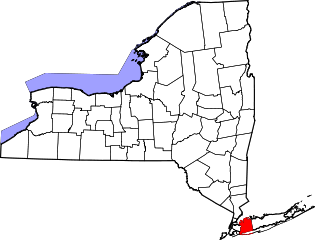 Vendors and lobbyists are now required to disclose campaign contributions and affirm the disclosed contributions were made without the expectation of a governmental benefit in return. The late-2015 amendment requires disclosure of contributions to county officials and county-level candidates if made on or after April 1, 2016.
Vendors and lobbyists are now required to disclose campaign contributions and affirm the disclosed contributions were made without the expectation of a governmental benefit in return. The late-2015 amendment requires disclosure of contributions to county officials and county-level candidates if made on or after April 1, 2016.
While the amendment aims at promoting greater transparency of the procurement process, some have argued contributions to political parties and noncandidate committees allow contributors to remain out of public view.
April 29, 2016 •
Harsher Penalties Proposed for New York Election Law Violations
State Sen. Terrence Murphy introduced a bill aiming to better prohibit unlawful campaign contributions and increase penalties for state election law violations. Senate Bill 7381 forbids any person acting on behalf of a public officer, candidate, or political committee from […]

State Sen. Terrence Murphy introduced a bill aiming to better prohibit unlawful campaign contributions and increase penalties for state election law violations. Senate Bill 7381 forbids any person acting on behalf of a public officer, candidate, or political committee from soliciting a contribution to a county or town committee for the benefit of the candidate when a direct contribution to the candidate or committee is unlawful.
The bill also increases the penalty for violations to a felony punishable by one to seven years of incarceration. The legislation responds to public concern following Mayor Bill de Blasio’s 2014 fundraising activities.
If the bill is adopted, it will become effective immediately.
April 15, 2016 •
NYC to Consider Campaign Finance Reforms
The New York City Council is scheduled to review a package of eight campaign finance reform bills on May 2, 2016. The bills seek to increase transparency and prevent lobbyists from bundling contributions to candidates. The bills are based on […]
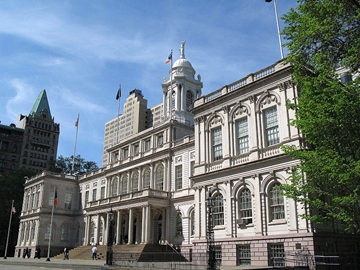 The New York City Council is scheduled to review a package of eight campaign finance reform bills on May 2, 2016. The bills seek to increase transparency and prevent lobbyists from bundling contributions to candidates.
The New York City Council is scheduled to review a package of eight campaign finance reform bills on May 2, 2016. The bills seek to increase transparency and prevent lobbyists from bundling contributions to candidates.
The bills are based on recommendations made by the New York City Campaign Finance Board in their 2013 post-election report. The legislation package was introduced with the goal of having reforms made prior to the 2017 municipal election cycle.
Photo of the New York City Hall by Momos on Wikipedia.
April 13, 2016 •
NY’s JCOPE Confirms Resignation of Two Commissioners
New York’s Joint Commission on Public Ethics (JCOPE) has confirmed that two commissioners have resigned from their positions. The resignations of commissioners David Arroyo and Joseph Covello were not announced publicly, but their names did not appear on JCOPE’s annual […]
 New York’s Joint Commission on Public Ethics (JCOPE) has confirmed that two commissioners have resigned from their positions. The resignations of commissioners David Arroyo and Joseph Covello were not announced publicly, but their names did not appear on JCOPE’s annual report that was recently released.
New York’s Joint Commission on Public Ethics (JCOPE) has confirmed that two commissioners have resigned from their positions. The resignations of commissioners David Arroyo and Joseph Covello were not announced publicly, but their names did not appear on JCOPE’s annual report that was recently released.
The news of these departures comes just weeks after Seth Agata was selected as the new executive director of JCOPE.
After nine months of searching and receiving over 200 resumes, the New York Joint Commission on Public Ethics has finally found a new executive director. Seth H. Agata, a former top aide to Gov. Cuomo, was named as the new […]
 After nine months of searching and receiving over 200 resumes, the New York Joint Commission on Public Ethics has finally found a new executive director.
After nine months of searching and receiving over 200 resumes, the New York Joint Commission on Public Ethics has finally found a new executive director.
Seth H. Agata, a former top aide to Gov. Cuomo, was named as the new Executive Director of the Commission. His prior experience includes being the Chair of the New York Public Employment Relations Board, Acting Counsel and First Assistant Counsel to the Governor, as well as a former Assistant District Attorney in Columbia County.
March 18, 2016 •
NY Campaign Finance Lawsuit Dismissed
A lawsuit seeking to eliminate the “LLC loophole” for political contributions was dismissed this week. The loophole, which allows large contributions by organizations controlling many limited liability companies, treats each limited liability company as a separate entity capable of contributing […]
 A lawsuit seeking to eliminate the “LLC loophole” for political contributions was dismissed this week. The loophole, which allows large contributions by organizations controlling many limited liability companies, treats each limited liability company as a separate entity capable of contributing the maximum amount an individual may give.
A lawsuit seeking to eliminate the “LLC loophole” for political contributions was dismissed this week. The loophole, which allows large contributions by organizations controlling many limited liability companies, treats each limited liability company as a separate entity capable of contributing the maximum amount an individual may give.
Gov. Cuomo and Assembly Democrats support closure of the loophole, and the decision is expected to be appealed to the Appellate Division of the Third Judicial District of New York.
State and Federal Communications, Inc. provides research and consulting services for government relations professionals on lobbying laws, procurement lobbying laws, political contribution laws in the United States and Canada. Learn more by visiting stateandfed.com.

